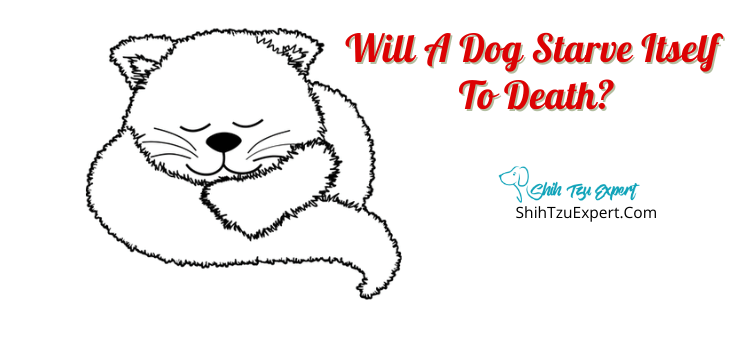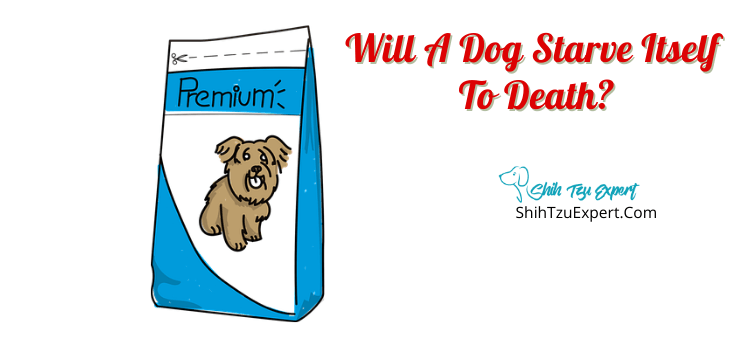Dogs have notoriously big appetites, so when they’re not eating it tells us that something’s up.
So when they stop eating, or not eating as before you should be worried!
Read on to find out why your dog’s not eating and what you can do to help them get back to feeling themselves.
Will A Dog Starve Itself To Death?
Dogs won’t starve themselves to death but they will stop eating in response to physical and psychological factors. They can be encouraged to eat by creating a routine or making their food seem more appealing. A vet should be consulted if a dog hasn’t eaten for more than 48 hours.

My Dog Refuses To Eat Anything Whatsoever?
Likely due to some kind of physical or psychological discomfort, your dog isn’t eating. It’s important to get to the root of the problem in order to solve it and make sure that your furry friend can happily tuck into their food once again.
You should take your dog to the vet if they haven’t eaten anything in the past 48 hours.
Your vet can help you try to work out why your dog isn’t eating and conduct any medical tests necessary.
How Long Does It Take For A Dog To Die Of Starvation?
Dogs can go much longer than humans without food, in fact, some dogs will regularly fast for two days. However, fasting or starvation for over a week can lead to long-term health implications.
Some dogs have been known to survive months without food, drinking only water. Drinking is actually more important than eating, as dogs can only survive 2-3 days without hydration.
Some factors will affect how long a dog can survive without food, such as breed, age and overall health.
Dog Won’t Eat His Food But Will Eat Treats?
If your dog is turning down their bowl of food but will eat treats and scraps, you’ve got a picky eater on your hands.
It can be tempting, when your dog isn’t eating, to offer them leftovers or treats to try to encourage their appetite. But watch out, this could encourage them to stop eating their normal food by rewarding their behaviour!
It’s important to try and get your pup back to their normal food, as this will provide them with a balance of all the vitamins and nutrients that their body needs.
My (14, 15 Year Old) Dog Stopped Eating?
It can be especially concerning if you have an older dog that has stopped eating, but there are plenty of potential explanations. Just like with us, a dog’s appetite changes and decreases with age, in proportion to their activity levels and the calories they burn.
You should always check with your vet if you are concerned about the health of your dog.
What Do You Feed An Old Dog That Won’t Eat?
As dogs age and lose their sense of smell and sight, it’s natural that this might affect their appetite and put them off their normal kibble. It’s recommended to soften their food, using water or gravy and to mix in some treats or human food to encourage them to eat.
If this doesn’t work, you could try to cook a meal for them, including meat, vegetables and rice or pasta for a fully balanced diet.
Make sure that the food is easy to chew, warm and moist, to stimulate their appetite and sense of smell.
What Does It Mean When An Old Dog Refuses To Eat?

Older dogs might lose their appetite due to medical reasons too. If their joints hurt too much to reach down to their food bowl, or their teeth are too sore to chew properly, these are both reasons why your dog might not be able to enjoy their meals anymore.
A lack of appetite could also be a sign of gastrointestinal disease or another medical condition.
Sadly, a very old dog who refuses to eat anything could be at the end of their life. You should speak to your vet to get your dog’s health checked out and they’ll be able to support you in making your pup’s last moments calm and comfortable.
What Do You Do When An Old Dog Stops Eating?
Try raising their food bowl to make it more accessible and ensure that the food is easy to chew on.
This minimises the distance they need to bend down to eat and gives their joints and teeth a bit of a break.
Go to the vet.
Your vet will give you all the help and advice you need. In very severe cases, they might prescribe your pup appetite-stimulating medication.
Should I Force Feed My Dog?
You’ve tried everything you can think of to stimulate your pup’s appetite and make their meals as appetising as possible but to no avail. Under certain circumstances, you can try force-feeding your dog with liquids using a syringe.
You should always consult your vet before force-feeding your pup and they’ll help to ensure that you’re providing the right nutritional value.
Should I Starve My Dog?
In some situations, like after vomiting and diarrhoea, it’s best to withhold food for around 8 hours from the last episode, to avoid upsetting your dog’s stomach again.
Some medical procedures will also ask for a period of fasting beforehand. In both circumstances, you should ask for your vet’s advice first.
Will Dogs Starve Themselves If They Don’t Like Their Food?
If your dog is a picky eater, they’ll eat treats and human food but not their dog food. Although it might feel a bit like starving them, you should avoid indulging them with the food they like to try and encourage them to get back to their normal eating habits.
It’s best to create a routine and stick to it.
Leave your dog’s food out for half an hour, or until they wander away from it, then clear it. Having food available for limited periods should encourage your pup to eat whilst they’ve got the opportunity.
It’s also better to make sure that they’re not eating at the same time as you are. If they know that there’s something better on offer, they’ll be more likely to turn their nose up at what’s in front of them.
Always make sure your pup has fluids available and is drinking enough.
Will A Dog Eat If He Gets Hungry Enough?
It might take a couple of days, but if you continue withholding treats and special foods from them, eventually your pup will get hungry enough to eat their dinner.
Of course, this method only works if you are 100% certain that your dog is being picky and that there are no underlying causes of appetite loss, such as pain or disease.
How Long Will A Dog Starve Itself?
A healthy dog can choose to last as long as a week without a meal.
However, if your dog’s decreased appetite coincides with symptoms such as vomiting or diarrhoea, you should see the vet within 48 hours. Younger dogs are much more dependent on the nutrients they get from their food, so these symptoms in puppies should be checked within 24 hours.
Will A Dog Intentionally Starve Itself?
Dogs can starve themselves on purpose. They might be doing this in response to a gastrointestinal disease or to try and convince you to upgrade their regular bowl of dog food to whatever you’re having that smells so good.
If they’ve got a sore tooth, a fever or are feeling poorly, it’s only natural that your pup might choose to skip a few meals until they’re feeling better.
Be sure that they’re getting a good supply of fluids.
How Do I Know If My Dog Is Starving To Death?
Your dog won’t starve itself to death. Don’t panic!
If they’re just being picky with their food they will cave in to their hunger cravings eventually.
If your dog is obviously losing weight, you should speak with your vet, as this could be a sign of serious health issues.
Dogs will stop eating when they’re dying though. Before they pass away, it’s common to see your dog start to engage less with their food and their surroundings, become more lethargic and lose their continence.
At this stage, try to provide them with as much comfort and support as you can. Some dogs might not have an appetite at all, but others might appreciate a special treat.
It’s a tragic moment to lose a pet, but a good time to reflect on your life and many happy moments spent together. They’ll appreciate you being there too.
How Long Can A Dog Go Without Food Before Dying?
A grown, healthy dog can go up to a week without eating, with very little consequence. Some dogs can survive for around a month with no food, as long as they have a supply of water.
Generally, bigger dogs will survive for the longest time as they have more stores of fat and muscle, which the body begins to metabolise as they enter starvation. Puppies, elderly and sick dogs won’t be able to survive this long.
Will Dogs Eventually Eat?
Unless your dog is chronically ill, they’ll eventually start eating again.
Give them some time, if they’ve been feeling poorly they might not want to eat so much all at once. Try giving them smaller portions, more often, before gradually returning to your normal feeding routine.
What Will Happen If My Dog Won’t Eat?
If your dog doesn’t eat, you’ll see them start to lose weight and become less active.
For the first couple of days that your dog has no food to digest, its body will start to metabolise carbohydrate stores, particularly those found in the liver. When these stores have become depleted, the metabolic process begins to shift towards gluconeogenesis, where fats and some proteins are the main sources of energy metabolised, instead of glucose.
The aim here is to ensure that important organs are receiving enough energy to function. Eventually, through a series of molecular pathways, including insulin and the thyroid hormone, the metabolic rate of the dog slows down, to minimise the use of its own body stores.
Starving and malnourished dogs need immediate medical attention.
You might want to feed it back to health, but meals should be given with caution to avoid Refeeding Syndrome. This occurs when too much food is given to a starving dog at once, causing serious shifts in the levels of chemicals inside their body. It can cause cramping, heart problems and respiratory failure.
Do Dogs Get Anorexia?
Yes, anorexia is the refusal to eat. There are two forms of anorexia in dogs, true and pseudo-anorexia.
True anorexia in a dog occurs when they have no desire to eat anything. It can be caused by psychological factors like stress and anxiety, caused by changes to their routine or environment, like moving house or getting a new pet or new family member. It can also be caused by physical factors that have put your pup off their food, for example, lack of smell or taste, poisoning or disease.
Pseudo-anorexia occurs when a dog has a desire to eat, but cannot. It’s caused by pain or disease that makes it too uncomfortable for your dog to chew or swallow their food.
Treatment depends on the cause of the problem. You should speak to your vet to make sure that your pup receives all the help they need. In serious circumstances, this could involve putting them on fluids or tube feeding them.
Reasons Why Your Dog Is Not Eating?
- They’re too picky! Your pup’s had one too many treats today and there’s definitely no space left for normal dog food. Try giving them fewer treats and snacks from the table and stick to your normal feeding schedule.
- Toothache (or pain anywhere else) If your dog is in too much pain, it’s normal for them to lose their appetite, particularly when it’s located around their mouth or throat.
- They’re sick If your dog has been throwing up recently, they might want to take a break from food until they feel better. It’s okay to wait for them to feel better but make sure they keep drinking lots! Alternatively, it could be a sign of a serious health problem, it’s always best to check with your vet.
- They’re bored – Your dog might have grown tired of eating the same meal every day. You can try mixing in some leftovers or treats, to reinvent their normal dinner and encourage them to eat more.
- They’re stressed – Psychological factors like anxiety can put your pet off their food. Try to work out the problem so that your dog feels safe and comfortable when they’re eating.
- Distractions – If your pet can smell your dinner whilst they’re chowing down, it’s likely that they’ll get so distracted by all the tantalising smells that they’ll forget about their food completely.
- Something doesn’t taste right – It’s possible that something has contaminated your dog’s food, making it smell and taste awful. A different brand of dog food might get them interested.
- They’re getting old – An older pooch needs less food as they burn less energy throughout the day. It’s possible that your old dog will skip a few meals from time to time. Try warming up their food and mixing some treats in to encourage them to eat.
- It’s not dinner time – It’s important to establish daily routines in your dog’s life. If you start feeding your dog at a different time of day than usual they’ll be more likely to refuse their food.
How To Get A Dog Who Is Not Eating To Eat?
- Exercise – A dog that’s been running around all day will most likely finish their food in front of you in the 10 seconds it takes you to put it down. Try taking your pup on a lengthier walk or play fetch until they drop, then try offering them their dinner and see if they can turn it down.
- Routine – Creating a feeding schedule helps your dog become familiar with their dinner times and what they are supposed to be eating. Puppies should be fed multiple times throughout the day, whereas older dogs usually eat twice.
- No Free Feeding – Leaving a bowl of food accessible to your dog can encourage them to become picky eaters. Try to create a routine where you offer your dog their food for 30 minutes maximum.
- Mix in some human food – Nothing seems tastier to your dog than the food they smell you eating, but they’re not allowed to touch! Try mixing in some leftovers with their normal food and see if you can encourage your dog to eat it that way.
- Safe, calm environment – If your dog feels threatened or is distracted by a busy environment, it can put them off eating. A quiet room or garden is the perfect place for your dog to eat.
Why Has My Dog Who Was Starving Itself Now Become Ravenous?
It’s normal. After a couple of days of not eating, your pup probably has a ginormous hole in his stomach to fill. Don’t endorse their huge appetite though, stick to feeding them their normal portions. Some dogs don’t know the size of their stomachs and might end up regurgitating their extra supper!
References
- Why is My Dog Not Eating? The Top 6 Reasons (veterinarians.org)
- Why Your Dog Won’t Eat: Causes & Solutions (webmd.com)
- Why Won’t My Dog Eat? Learn About Reasons Why Your Dog Isn’t Eating (akc.org)

![Shih Tzu Poodle mix [Your complete guide to Teddy bear dog | Shih Poo | Shoodle or Pooshi] Shih Tzu Poodle mix [Your complete guide to Teddy bear dog | Shih Poo | Shoodle or Pooshi]](https://shihtzuexpert.com/wp-content/uploads/2020/06/Are-You-a-Good-Match-for-a-Shih-Poo.jpg)
![6 Best Dog Treadmills for 2023 [Buyer’s Guide] 6 Best Dog Treadmills for 2023 [Buyer’s Guide]](https://shihtzuexpert.com/wp-content/uploads/2019/04/Best-Dog-Treadmills-1.png)
![12 Best Dog Foods for Toy Breeds [Buyer's Guide] 12 Best Dog Foods for Toy Breeds [Buyer's Guide]](https://shihtzuexpert.com/wp-content/uploads/2019/05/3-5.jpg)
